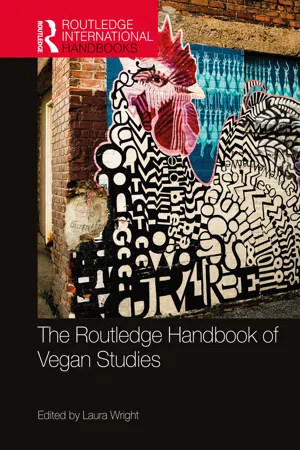1
Framing vegan studies
Vegetarianism, veganism, animal studies, ecofeminism
Laura Wright
(Excerpted from The Vegan Studies Project: Food, Animals, and Gender in the Age of Terror, 2015. Prior to the publication of The Vegan Studies Project, there was no cultural studies monograph that examined the social and cultural discourses that imagine the vegan body and vegan identity. This work is considered the foundational text in the field of Vegan Studies. Omitted material is indicated by “***”.)
[…] To be vegan, according to a memorandum of association of the Vegan Society, is to ascribe to a
philosophy and way of living which seeks to exclude—as far as is possible and practicable—all forms of exploitation of, and cruelty to, animals for food, clothing or any other purpose; and by extension, promotes the development and use of animal-free alternatives for the benefit of humans, animals and the environment. In dietary terms it denotes the practice of dispensing with all products derived wholly or partly from animals.
But this definition simplifies the concept of veganism in that it assumes that all vegans choose to be vegan for ethical reasons, which may be the case for the majority, but there are other reasons, including health and religious mandates, for why people choose to be vegan. Veganism exists as a dietary and lifestyle choice with regard to what one consumes, but making this choice also constitutes participation in the identity category of “vegan.” The tension between the dietary practice of veganism and the manifestation, construction, and representation of vegan identity is of primary importance to this study, particularly as vegan identity is both created by vegans and interpreted and, therefore, reconstituted by and within contemporary (non-vegan) media. In order to better understand this tension, it is necessary to examine the history of veganism as both practice and identity and then to read beyond that history into a changed politics of vegan representation that is not reflected in that history.
The history of a paradox
Tristam Stuart’s The Bloodless Revolution charts the history of vegetarianism in the West from 1600 to the present as an entity that was named in England in the 1840s and fully codified by the founding of the Vegetarian Society in 1847, the creation of which made “‘vegetarianism’ a fixed identity—indelibly associated with crankiness” (423), which, in turn, allowed for vegetarianism to be easily “pigeonholed and ignored” (xvii). This codification and naming classified “vegetarian” as a homogeneous entity emptied of intellectual nuance and, therefore, made vegetarianism both easily quantified and dismissed. Such authors as Stuart, Colin Spencer, and Karen and Michael Iacobbo have written various histories of vegetarianism as a dietary sociopolitical discourse with ancient origins, so I do not need to provide an extensive rehashing of those histories here. What I do wish to do, however, is look briefly at the ways these studies posit vegetarianism as a paradoxical ideology and the ways these studies treat veganism within the larger context of vegetarian history.
Stuart’s study situates vegetarianism as a philosophy rooted in the ancient past, with the West’s “‘discovery’ of Indian vegetarianism” in the seventeenth century having a basis well before Alexander the Great reached India in 327 BC (40); furthermore, he finds it an “extraordinary coincidence that roughly contemporaneous seminal and Greek philosophers, the Buddha and Pythagoras both taught … that it was wrong for people to eat animals” (41). In his exhaustive and meticulously researched work, however, while he utilizes the terms “vegan” and “veganism” throughout, Stuart never examines veganism as a separate identity that may be dependent on factors distinct from those that have influenced the cultural, religious, and social histories of vegetarianism.
What Stuart’s work does do, however, is present ethical vegetarianism as a paradox, at once interested in the preservation of life, even as the vegetarian is implicated, like any other living creature, in the cycle of life and death. As a perfect example, he cites Henry Brougham’s attack on Joseph Ritson’s An Essay on Abstinence from Animal Food, as a Moral Duty (1802) as an indictment of Ritson and those who agreed with his philosophy that animals have a natural right to their existence (362). Brougham claims that Ritson, despite being vegetarian, was nonetheless guilty “of starving calves by drinking milk, aborting chickens by eating eggs, and murdering whole ecologies of microscopic organisms every time he washed his armpits. Even while Ritson was in the act of writing his vegetarian arguments, he was using a quill plucked from a goose, ink made from crushed insects all while lighting his desk with a ‘whale-tallow candle’” (368). Brougham, like Darwin, makes explicit the ways that being caught up in the “great chain of life also meant submitting to the great chain of death” (368), noting that preventing killing was not only unnatural and antithetical to the very act of existence but also impossible. In Vegetarianism: A History, Colin Spencer likewise points to the tension inherent in the pursuit of a vegetarian ethic: “We do not adequately realize today how deep within our psyche is the reverence for the consumption of meat or how ancient in our history is the ideological abstention from the slaughter of animals for food” (331).
At its core, ethical vegetarianism does embody this paradox, the desire to preserve life even as one’s very existence implicates one as caught in th...
